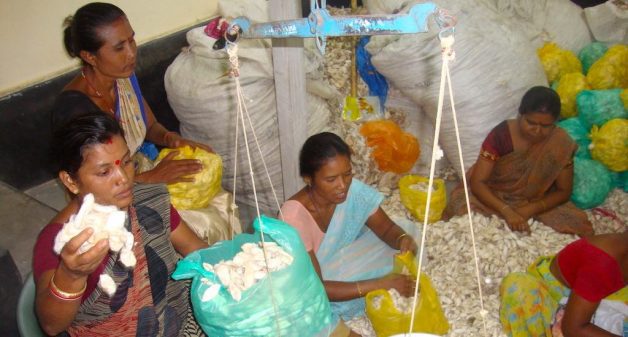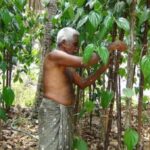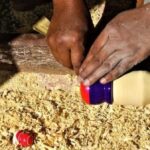Rural Assam lacked mainly in two aspects — lack of sustainable market linkages for rural produce and lack of access to financial services. Sarat Chandra Das has been filling these lacunae effectively, through Grameen Sahara that he founded.
Raised by a widowed mother, Sarat Das had to make several compromises as a student. Despite being an excellent student and having options to study engineering and medicine, he chose to study fisheries science, to lessen the financial burden on his mother and to get a job immediately after graduation.
Right from his college days, he involved himself actively in social service. After working in different organizations for a few years, with a strong desire to work for the community, he established Grameen Sahara with like-minded friends.
Eri silk weaving
Nearly 15 years ago, Eri silk weaving was a largely unorganized business activity. Women in villages carried out the weaving. Most of the households engaged in Eri silk weaving were poor. Keen to keep the traditional practices alive, Sarat conducted market research to explore the potential of Eri silk products.
Based on the research findings, Das decided to promote Eri silk business, involving the women weavers. Facilitated by Grameen Sahara, groups of 20 women each, joined together to form producer groups. Production centers, each catering to ten groups, supply cocoons to the women members at their doorstep. The women sell the yarn they produce at the production centers.

To streamline production and marketing operations, 600 women weavers as shareholders have formed Grameen Silk Producer Company Private Limited (GSPCL), under the guidance of Grameen Sahara. Groups of women take care of each business process.
This intervention has not only helped conserve traditional artisanal skills, but also increased the women weavers’ income. It has also saved the weavers money, energy and time spent on traveling to buy cocoons and sell yarns.
The women underwent training to upgrade their spinning skills. Grameen Sahara guided the women to avail of subsidies under government schemes, enabling them to buy electrical spinning machines and replace the manual ones. With the new machines, productivity increased by eight times.
The interventions reflect in the quality of work, and the household income. Women, who received Rs 30 per kg of yarn earlier, started receiving Rs 80 per kg. With the production centers facilitating the sale of yarns, middlemen who took away most of the profits, have been eliminated from the supply chain.
Rural financial access
Money available in a self-help group (SHG) for lending to members is often limited. Grameen Sahara established a microfinance company in 2014 – after three years of dogged efforts – to make credit easily available for community members, women SHGs in particular.
Today, the microfinance company has more than 20,000 registered members and 17 branches across three states – Assam, Meghalaya and Nagaland.
With the company’s motto of funding only income generating activities, the cumulative loan disbursal of Rs 75 crore and the present portfolio of Rs 14 crore has enabled countless members increase their income.
Livelihood interventions
Responding to community’s needs, always in consultation with members of the community, Grameen Sahara has initiated many projects to create better livelihood opportunities for villagers.
In Rihabari village in Chhaygaon block, Grameen Sahara facilitated the formation of Rengoni Gramya Sanghatana, a village organization. The organization runs a piggery unit, managed completely by a group of 125 women SHG members. Apart from producing a good breed of piglets to supply to villagers interested in rearing them, the organization provides relevant advice and assistance on feed, vaccination and the like.
Grameen Sahara created awareness about System of Rice Intensification (SRI) among farmers and gave technical inputs to boost rice yield. Farmers who follow the system have had an increased yield of up to 1.5 times.
Grameen Sahara has created nearly 30 diversion-based irrigation (DBI) projects, especially in hilly and high-slope areas of Assam-Meghalaya border. The DBI projects have brought more than 500 acres of land under irrigation, helping farmers grow a second crop.
Making a difference
Sarat Das always had the desire to work in the sphere of education. He had implemented an education project in five villages, to prevent school dropouts and to inculcate the value of education in children. When villagers felt the need for a school and asked Sarat to start one, he readily accepted. Grameen Sahara started Grameen Jyoti Academy in Dubjeni village in 2013. The school caters to students from four contiguous development blocks.

Responding to community’s needs and changing times, Grameen Sahara comes up with new projects. A small-scale fishery unit and a turmeric-processing unit are on the cards. It started a social business unit that functions as a marketing facilitator, helping rural producers, artisans and farmers sell their products.
Grameen Sahara’s interventions have benefitted nearly two lakh villagers, improving their socioeconomic conditions. With the projects in the pipeline, Grameen Sahara would make a difference in the lives of many more people, by helping them find a footing.
This article has been excerpted from the book Gems of Purest Ray Serene: Glimpse into lives and work of India’s outstanding social workers, edited by Sanjiv Phansalkar and Ajit Kanitkar, December 2017. The book is available for purchase on http://www.bookganga.com/eBooks/Books/details/5134897698503357844?BookName=Gems-Of-Purest-Ray-Serene
Sandeep Chavan is a homeopathic doctor, trained in public health administration from Tata Institute of Social Sciences, Mumbai. He works in Tata Trusts as program officer for health initiatives in eastern Uttar Pradesh.
Bikalp Chamola is a member of the research team at Vikasanvesh Foundation, Pune. A graduate of Institute of Rural Management Anand, earlier he worked with Rajeevika livelihood mission in Rajasthan.








